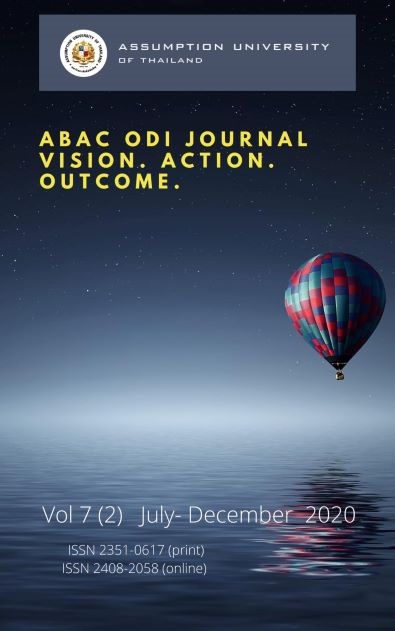Editorial
Abstract
Sirichai Preudhikulpradab, Ph.D.
Program Director, Master of Management (Organization Development), Assumption University, Bangkok, Thailand
The current issue of the ABAC ODI Journal. Vision.Action.Outcome comprises seven articles involving ten authors. The contributing authors represent local and international scholars, university’s faculty member, researcher, educator, organization practitioner, and graduate students as follows:
Farzin Hassanzadeh Kalashami - Australia
Chen Lin - China
Orisa Chumphong - Thailand
Suwit Srimai - Thailand
Wisanupong Potipiroon - Thailand
Sumontha Tonvongval - Thailand
Chamaiporn Tantivong - Thailand
Xiaowei Deng - China
John Paul - Myanmar
Yijun Luo - China
The first article is qualitative research, titled “A Proposed Improvement Plan on Competencies and Skills Using Generative Analysis Approach: A Case of the Staff of the Office of Graduate Studies, Assumption University of Thailand” by Farzin Hassanzadeh Kalashami. The article focuses on five variables, which are human resource, competency, skill, communication, and problem-solving. The author employs the in-depth interview method to explore collective insights of the key informants to propose an improvement plan for long-term organization development.
The second article is quantitative research, titled “The Effect of Inclusive Leadership on Employee Well-Being: A Case of XYZ Bank in Yunnan, China” by Chen Lin. The article focuses on six variables, which are inclusive leadership, equal treatment, employee participation, respect for the employee, value recognition, and employee well-being. The author employs descriptive statistics and multiple linear regression to determine the effects of the independent variables on the dependent variables.
The third article is an exploratory study, titled, “The Resource-Based View, Dynamic Capabilities and SME Performance for SMEs to Become Smart Enterprises” by Orisa Chumphong, Suwit Srimai, and Wisanupong Potipiroon. The authors focus on four variables, consisting of the resource-based view, dynamic capabilities, strategy, small and medium-sized enterprises. This article presents several implications for the development of SMEs and strategies for competitiveness based on the concept of the resource-based view (RBV).
The fourth article is an empirical research, titled, “Findings of Main Obstacles Facing Thai SMEs towards Business Growth Sustainability” by Sumontha Tonvongval, and Chamaiporn Tantivong. The article focuses on five variables, which are Thai SMEs, growth, performance, entrepreneurial competencies, and sustainability. The authors employ the meta-analysis method to explore key implications to the growth of Thai SME’s, utilizing the actual cases of 2027-2019 consultation projects, involving 34 SME’s manufactures in Thailand
The fifth article is quantitative research, titled “Determining the Influence of Motivation and Job Satisfaction towards Job Performance of Generation Y+Z Employees of The RARE Company, China” by Xiaowei Deng. The article focuses on three variables, which are job satisfaction, motivation, and job performance. The author employs descriptive statistics and one-way ANOVA to determine the influence of motivation on job satisfaction and job satisfaction on job performance, respectively.
The sixth article is an needs assessment , titled “Identifying the Factors to Enhance Training Effectiveness: A Case Study of KNGY Teacher Volunteers, Myanmar” by John Paul. The article focuses on six variables, which are training effectiveness, training needs assessment, training contents, self- efficacy, supervisory support, and transfer of knowledge. The author employs descriptive statistics and correlations.
The seventh article is a needs assessment, using the survey and interview, titled “Assessing Employees’ Belongingness for Long-Term Sustainability of the Company: A Case of G Company, Bangkok, Thailand by Yijun Luo. The article focuses on five variables, which are compensation & benefits, company culture, professional training, career development, and employee’s belongingness. The author employs descriptive statistics and correlation to determine the strategies for enhancing employee’s belongingness.
In summary, together with its contributing authors who have shared their interdisciplinary knowledge and experience from their respective fields with our Organization development community, we hope that these seventh articles provide the readers with some useful information, findings and implications, and applications to support your future works further.



